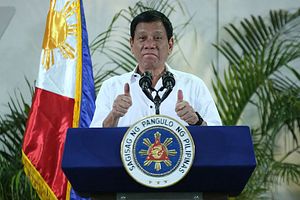More than a month after imposing a lockdown in mainland Luzon, Philippine President Rodrigo Duterte said the order to stay at home will be extended for another two weeks to contain COVID-19.
But as more cases of infection continue to be reported, the authorities have hinted at the possibility of a prolonged lockdown beyond April 30 in a bid to flatten the coronavirus curve.
The president’s spokesperson accused pasaway (reckless) individuals who are allegedly breaking quarantine protocols and risking the further spread of the virus. But this argument puts the blame on quarantined residents while keeping silent on the government’s shortcomings in dealing with the public health crisis.
An alternative perspective is provided in a Senate resolution, which asks the president to fire Health Secretary Francisco Duque III for actions that “show lack of competence, efficiency, and foresight bordering on negligence in handling the health crisis.” Filed by 14 senators, led by the Senate president, the resolution cited the secretary’s failure to prepare the country’s health sector and the public in preventing the COVID-19 outbreak. This is a strong statement coming from the senators, the majority of whom are allies of the president.
The president’s office responded by affirming Duterte’s confidence in Duque’s performance.
A surprising development was the resignation of Socioeconomic Planning Secretary Ernesto Pernia. He said he had “differences in development philosophy” with some Cabinet members. He later told the media that he has always stood for a “modified quarantine” to revive the economy but other members of the Cabinet disagreed with him.
“When the orchestra is not well-orchestrated, then you have a little problem,” Pernia said, referring to the lack of consensus in implementing COVID-19 measures.
The Senate resolution against the key official leading the fight against the pandemic and the resignation of the country’s chief economist at a time when the government is struggling to deliver emergency aid to the poor reflect rising dissatisfaction over Duterte’s leadership in confronting the pandemic.
The senators directed their frustration against Duque, but they should know that the health secretary was simply following directives from the president. The senators questioned why Duque was late in advising a travel ban against China, his failure to ensure an adequate supply of protective equipment for frontline workers, his reluctance in conducting mass testing and the establishment of testing laboratories, and his lack of transparency about COVID-19 cases in the country. Duque is indeed responsible for all of these issues, but the president should share the blame too. After all, it was Duterte who rejected the proposed travel ban, repeatedly belittled the seriousness of COVID-19, urged Filipinos to go out and travel around the country, and failed to provide the public with accurate and comprehensive information about the pandemic and the government’s response.
The senators are either refusing to start a war of words with the executive branch by omitting the accountability of the president or they are simply maneuvering to put blame for the government’s ineffective COVID-19 response on Duque alone.
The president was granted special powers by Congress to realign funds and mobilize the bureaucracy in battling COVID-19, but his office was seen by many as slow and indecisive in carrying out urgent medical measures to contain the virus.
As the lockdown practically stalled the economy, the government is expected to provide lifeline subsidies to low-income households and displaced workers. But bureaucratic squabbling among officials and partisan politics continue to beleaguer the distribution of aid. The delay and insufficient coverage of social protection measures are exacerbating public anxiety, hunger, and isolation of the poor. Many are worried about the government’s capability to tap existing and new resources to help the affected population if the lockdown is extended for another month.
Pernia’s sudden resignation and suggestion of an alternative option to a total lockdown has raised more questions among the public about the government’s responses.
Instead of carefully explaining the government’s health and social relief strategy, Duterte has been more consistent in attacking the opposition, the Left, and “disobedient” local officials. He threatened to impose a martial law-type lockdown in order to enforce quarantine protocols. This announcement naturally garnered criticism since it seeks to silence, harass, and detain those who are merely asking for food and urgent relief. It revived memories of the country’s martial law era in the 1970s, when an authoritarian government brutally suppressed the opposition and all dissenting voices.
The next two weeks are therefore crucial for the Duterte government to convince the people that its approach is correct in curbing the rise of infections while providing the medical and basic needs of the people. But if Duterte’s notorious anti-drug strategy is adopted as a model, it could mean an intensive and massive deployment of police and military troops in communities not just to implement quarantine rules but impose rigorous control of the local population. This scenario is what many human rights advocates would like to avoid, but it seems Duterte’s team is already gearing for a total lockdown approach in fighting COVID-19.

































